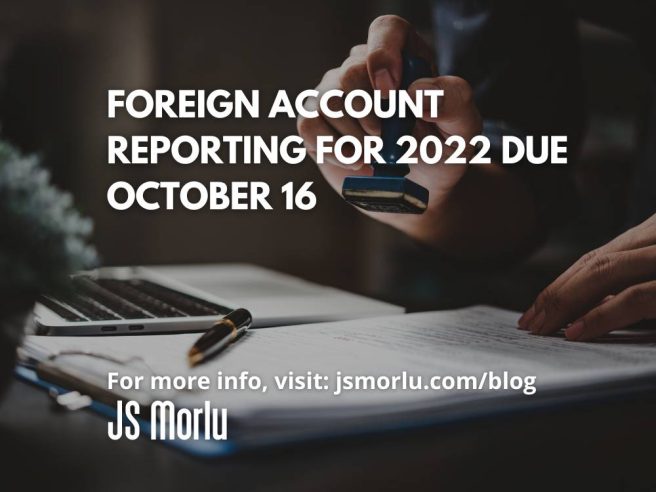In the complex world of financial regulations, foreign accounts can often be shrouded in mystery. But for US entities – individuals, corporations, partnerships, and trusts alike – understanding their reporting requirements is crucial to avoid hefty penalties and potential legal trouble. This comprehensive guide delves into the intricacies of foreign account reporting, ensuring you navigate the landscape with clarity and confidence.
Why the US Cares about Your Foreign Accounts
The US government has two primary reasons for keeping tabs on your foreign financial dealings:
- Tax Compliance: Foreign financial institutions may not have the same reporting requirements as their US counterparts. Requiring disclosure of foreign accounts helps the IRS cross-check income reporting and identify potential tax evasion.
- Combating Illicit Activity: Tracking foreign accounts aids in uncovering illegal activities like money laundering and financing terrorism. By monitoring these accounts, the government can crack down on financial crimes that threaten national security.
Reporting Your Foreign Accounts
The key reporting form for foreign accounts is the Report of Foreign Bank and Financial Accounts (FBAR). This form, filed electronically with the Financial Crimes Enforcement Network (FinCEN), is mandatory if the aggregate value of your foreign accounts exceeds $10,000 at any time during the year.
Important Deadlines and Extensions:
- The FBAR filing deadline for 2022 was originally April 18, 2023, but an automatic extension was granted until October 16, 2023.
- Note that the FBAR is not filed with the IRS; it’s a separate FinCEN filing.
Penalties for Non-Compliance
The consequences of failing to file the FBAR can be severe:
- Non-willful failure: Up to $10,000 in civil penalties.
- Willful violation: The greater of $100,000 or 50% of the account balance at the time of the violation, plus potential criminal prosecution with a fine of up to $250,000 and five years in prison.
Beware the “Willful” Trap
Even unintentional omissions on the FBAR can be deemed willful if you answer “yes” to having foreign accounts on Schedule B of your Form 1040 tax return. This highlights the importance of meticulous accuracy when reporting your foreign financial interests.
What Constitutes a “Foreign Account”?
The term “foreign account” encompasses a broad range of financial instruments, including:
- Securities and brokerage accounts
- Savings, checking, deposit, and time deposit accounts
- Commodity futures and options
- Mutual funds
- Non-monetary assets like gold
An account is considered “foreign” if the holding financial institution is located outside the US. Shares of foreign stocks or mutual funds held in US accounts, however, are not subject to FBAR reporting.
Unforeseen Foreign Accounts
You might unknowingly have an FBAR filing requirement. For instance, if your name appears on a foreign relative’s bank account exceeding $10,000 at any point during the year, you’re obligated to file the FBAR. Similarly, online gambling accounts at foreign casinos exceeding the $10,000 threshold trigger reporting obligations.
Beyond the FBAR: Form 8938
In addition to the FBAR, you may also need to file IRS Form 8938. This form covers a broader range of foreign assets, including real estate, life insurance policies, and certain retirement accounts, with higher reporting thresholds:
- Married filing jointly: $100,000 at year-end or $150,000 at any point during the year.
- Other filing statuses: Half the amounts mentioned above.
- Living abroad: $400,000 and $600,000, respectively.
The penalty for failing to file Form 8938 is $10,000 per year, with a potential escalation to $50,000 if the non-compliance persists beyond 90 days of IRS notification. Therefore, seeking professional guidance remains your best bet for navigating the often-complex landscape of foreign account reporting and ensuring you stay compliant without risking costly penalties. Remember, proactive engagement with the rules and regulations can save you significant headaches and financial burdens in the long run.
Conclusion
Navigating the intricacies of foreign account reporting may seem complex, but understanding the requirements and seeking professional guidance can demystify the process and ensure seamless compliance. By staying informed and taking proactive steps, US citizens and entities with foreign financial interests can avoid costly penalties and contribute to a transparent and secure financial system. Don’t let foreign account reporting become a financial nightmare. Unfiled Form 8938s carry a hefty $10,000 annual penalty, with the potential to balloon to $50,000 after 90 days of IRS notice. Avoid the stress and ensure smooth compliance by partnering with our experienced professionals. We’ll navigate the complexities for you, protecting you from costly penalties and contributing to a transparent financial system. Say goodbye to foreign account headaches – call us today and enjoy peace of mind.
JS Morlu LLC is a top-tier accounting firm based in Woodbridge, Virginia, with a team of highly experienced and qualified CPAs and business advisors. We are dedicated to providing comprehensive accounting, tax, and business advisory services to clients throughout the Washington, D.C. Metro Area and the surrounding regions. With over a decade of experience, we have cultivated a deep understanding of our clients’ needs and aspirations. We recognize that our clients seek more than just value-added accounting services; they seek a trusted partner who can guide them towards achieving their business goals and personal financial well-being.
Talk to us || What our clients says about us


